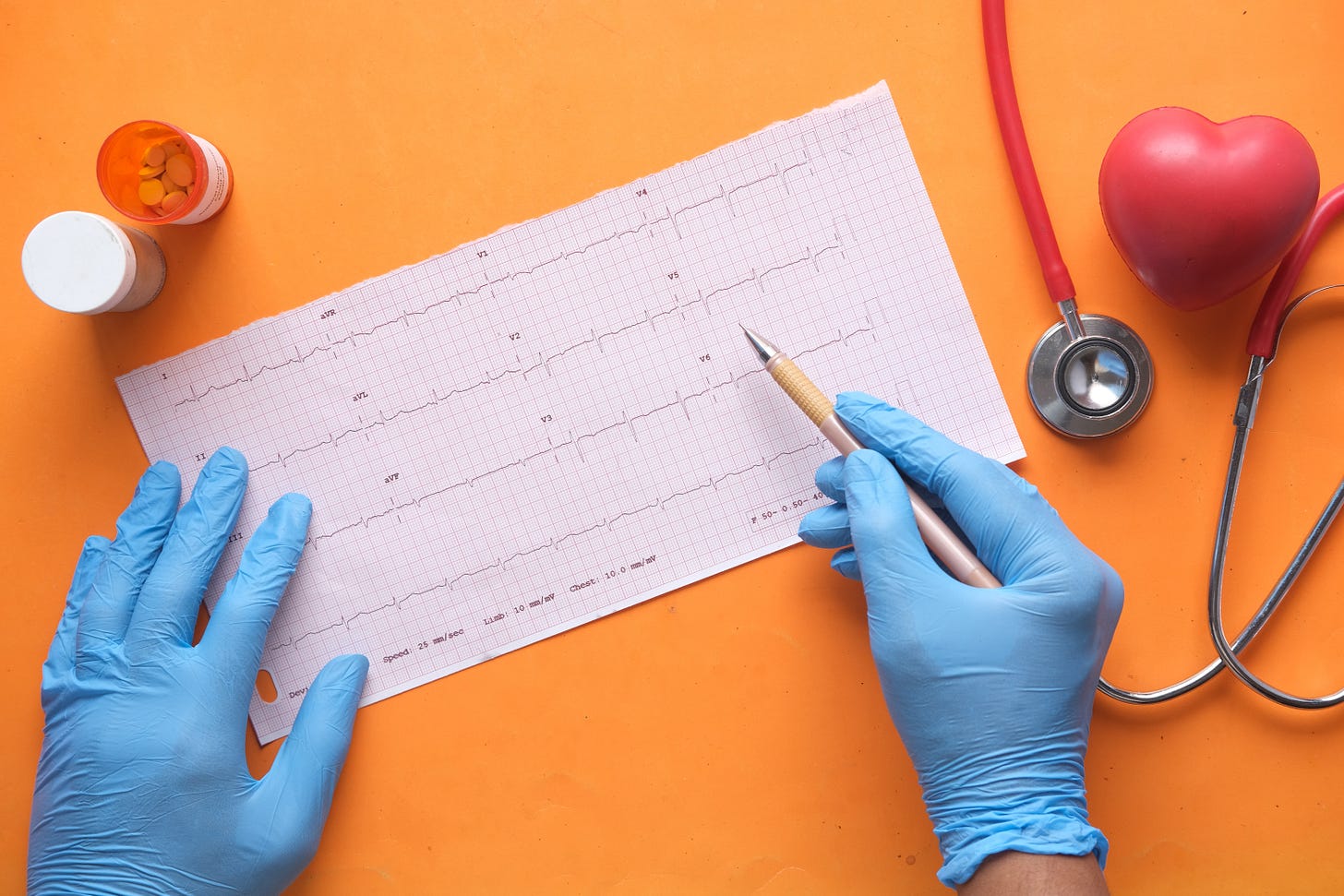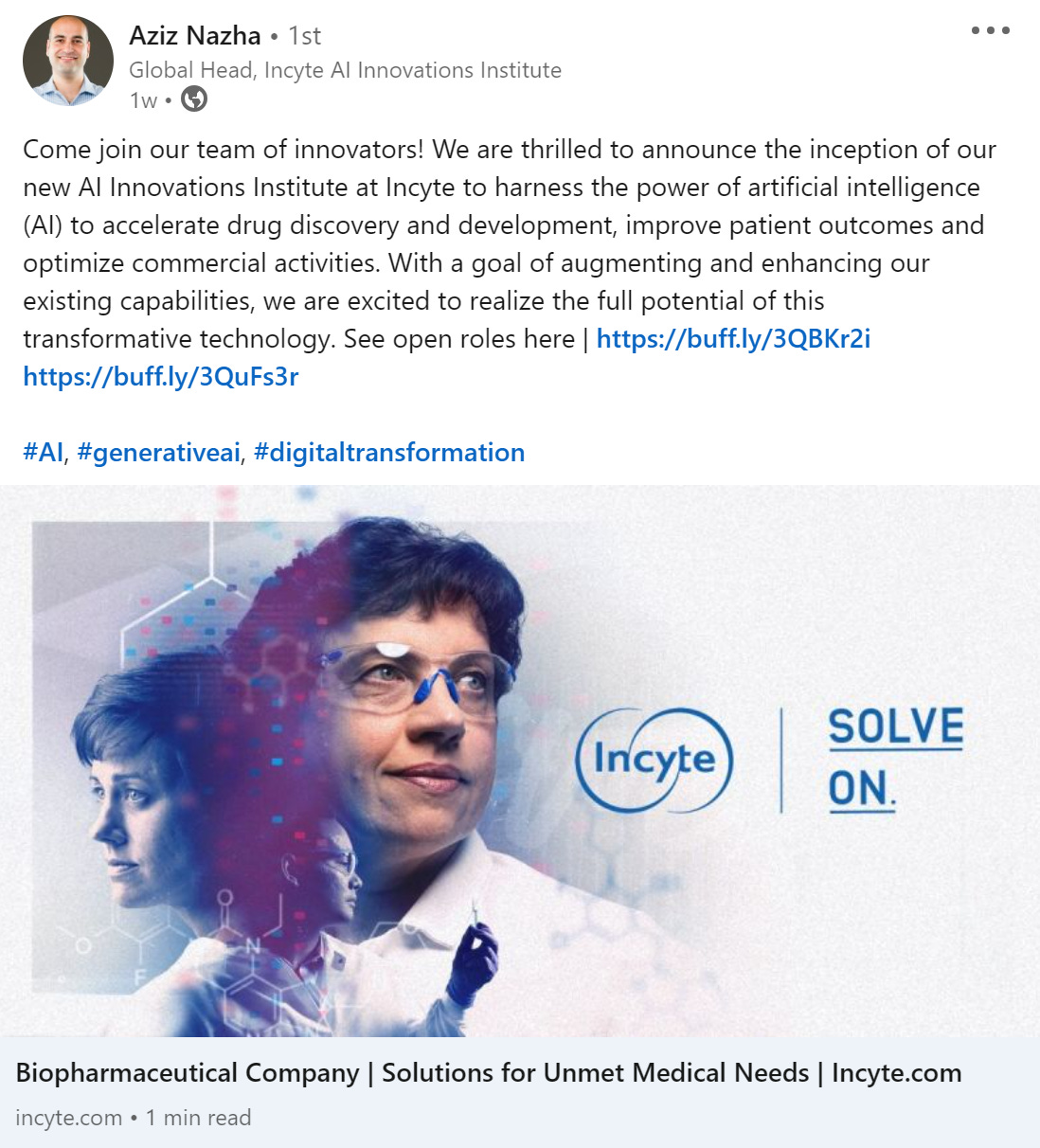AI Predicts Parkinson's Subtypes, Transforms Breast Cancer Screening, and Detects Hidden Heart Defects from ECGs! 🤖
Weekly Updates on AI in Medicine 🤖🩺🚀
“Move fast and break things…unfortunately in medical AI that means kill people” – Prof Enrico Coiera, AAAIH
Dear Med AI Enthusiast,
Welcome to this edition of The Med AI Capsule Weekly Newsletter! ⚕️🤖💊 I'm really excited to have you with me as we dive into the fascinating world of Medical AI.
In this newsletter, I'll be your guide, taking you through the latest updates and thought-provoking ideas in the ever-changing field of artificial intelligence in medicine.
Whether you're an interested medical professional, a tech enthusiast, or just curious about the future of medicine, 'The Med AI Capsule' is here to lead the way and show you the exciting possibilities and cautionary areas for AI in medicine.
So, get ready for an adventure, and let's explore this thrilling journey together!
In today’s capsule:
AI Nails Parkinson's Subtypes with 95% Accuracy
AI-Powered Patch Brings Breast Cancer Screening into Your Hands
AI Model Detects Hidden Heart Defects in ECGs
Other Med AI News
Social Post of the Week
Med AI Event
Med AI Work Opportunity
Fun Fact
Reading Time: 5 minutes
QUICK HITS/ LINKS: (Scroll down for deep dive)
Study Finds AI System That Analyses Cells for Faster Diagnosis of Blood Diseases
Artificial Intelligence Uncovers the Best Drug Combos To Prevent COVID Recurrence
CMC Vellore, IIT-M Sign MoU on Artificial Intelligence in Healthcare
AI Nails Parkinson's Subtypes with 95% Accuracy

Researchers at the Francis Crick Institute and UCL Queen Square Institute of Neurology, working with technology company Faculty AI, have shown that machine learning can accurately predict subtypes of Parkinson’s disease using images of patient-derived stem cells.
Why is it important?
This could enable personalized medicine and targeted drug discovery for Parkinson's patients based on their specific disease subtype.
Accurately identifying subtypes allows for tailored treatments and better patient care.
The computer models were able to classify subtypes with up to 95% accuracy using images of patient stem cells.
“We don’t currently have treatments which make a huge difference in the progression of Parkinson’s disease. Using a model of the patient’s own neurons, and combining this with large numbers of images, we generated an algorithm to classify certain subtypes – a powerful approach that could open the door to identifying disease subtypes in life.
Taking this one step further, our platform would allow us to first test drugs in stem cell models, and predict whether a patient’s brain cells would be likely to respond to a drug, before enrolling into clinical trials. The hope is that one day this could lead to fundamental changes in how we deliver personalised medicine.” - James Evans, PhD student at the Crick and UCL
Caution:
While the AI technique shows promise, it needs further validation before being ready for clinical use. There is a risk of misclassification if the models are not thoroughly tested. Rigorous evaluation is essential to ensuring patient safety and effective treatment. Additionally, ethical considerations around the use of patient data must be addressed. Responsible development and application of the AI method are key.
AI-Powered Patch Brings Breast Cancer Screening into Your Hands

Researchers at MIT are developing a wearable ultrasound device that attaches to a bra to screen for breast cancer.
Why is it important?
This could allow for more frequent breast cancer screening between mammograms for high-risk women.
Catching tumours early maximizes survival rate - breast cancer detected early has a 99% 5-year survival rate.
The device aims to provide accessible, at-home screening as a complement to mammograms.
"The AI integration has the potential to enhance diagnostic accuracy through data analysis, and also holds potential for early detection and personalized care pathways." - Dr Harvey Castro, physician & speaker on AI in healthcare
Caution:
The technology is still in early development and needs extensive testing and FDA approval before becoming commercially available, which could take some years. It should not replace professional medical expertise and mammograms. There are also ethical considerations around the privacy of data and access disparities to address. Responsible implementation is key.
AI Model Detects Hidden Heart Defects in ECGs

Researchers have developed an AI model to screen electrocardiograms (ECGs) for signs of atrial septal defects (ASD).
Why is it important?
ASD is an underdiagnosed heart condition that can lead to irreversible damage if not caught early.
The AI model detected ASD with 93.7% accuracy, better than traditional ECG analysis.
This could enable population-level screening to identify ASD before complications arise.
"If we can deploy our model on a population-level ECG screening, we would be able to pick up many more of these patients before they have irreversible damage." - Dr Shinichi Goto, Brigham and Women's Hospital
Caution:
The model needs further validation on more general populations beyond academic medical centres. Additionally, as a "black box" system, it provides limited visibility into what ECG features are most indicative of ASD. Ethical review is warranted given the sensitive nature of medical data. Responsible design and testing are essential before real-world implementation.
Other Med AI News:
A new AI system called Haemorasis can rapidly analyze images of blood cells to help diagnose blood disorders like anaemia and myelodysplastic syndrome. Researchers at the German Cancer Research Center trained the system on images from hundreds of patients. In tests, Haemorasis accurately classified white and red blood cells and suggested genetic subtypes of diseases. This computer-aided analysis of blood samples could improve the initial diagnosis of blood disorders and identify patients needing further testing. The research was published in Nature Communications.
A new machine learning study analyzed real-world data from a Chinese hospital to reveal optimal drug combinations for preventing COVID-19 reinfection based on patient factors like age and health conditions. Researchers pioneered a technique to virtually match similar patients getting different treatments, enabling them to generalize treatment efficacy across subgroups. The findings suggest age and disease conditions should inform personalized prescription, and demonstrate how AI can enable personalized medicine by leveraging rich datasets like this unique one tracking patients post-discharge. Overall, the study reveals how machine learning applied to real-world evidence can optimize tailored COVID-19 treatment.
The Christian Medical College Hospital Vellore and the Indian Institute of Technology Madras have signed a Memorandum of Understanding to collaborate on artificial intelligence research and capacity building in healthcare. Leveraging their respective expertise in medicine and AI, the institutions aim to conduct joint studies on responsible AI applications that can provide insights for preventive, curative, and predictive patient care. This partnership combines CMC Vellore's experience in healthcare domains like basic sciences and public health with IIT Madras' strengths in AI. Overall, the collaboration seeks to explore the vast potential of artificial intelligence to analyze healthcare data and develop impactful solutions that improve patient outcomes.
SOCIAL POST OF THE WEEK
MED AI EVENT
MED AI WORK OPPORTUNITY
Let’s wrap it up with a historical fun fact!
In his book Politics, Greek philosopher Aristotle briefly imagined machines capable of performing tasks by themselves, which would make servants and slaves unnecessary. (Reference)
Stay tuned for our upcoming editions as we explore the latest breakthroughs and dive deep into AI's transformative power, shaping a healthier future.
Warm regards,
P.S.: If you're a medical professional intrigued by artificial intelligence but not sure where to start, I've got something great for you!
Check out my CPD-accredited course on Bionabu (UK) platform and join our vibrant WhatsApp Community.
For personalized assistance and guidance, click HERE.







